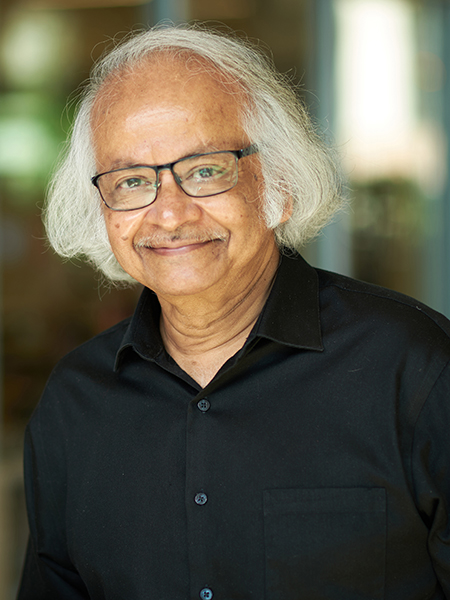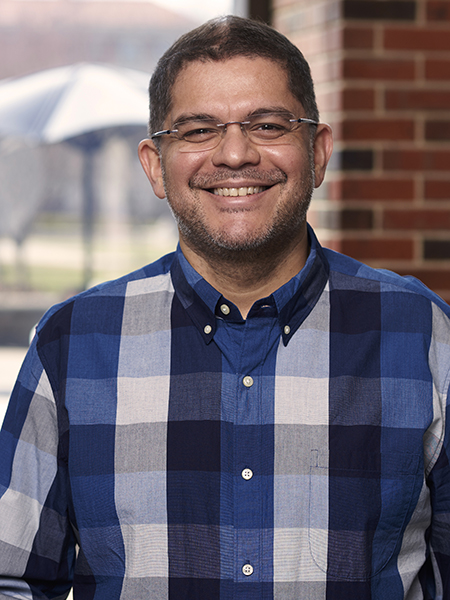Purdue professors Supriyo Datta and Sunil Bhave working on MURI grant projects
The U.S. Department of Defense (DoD) has announced grants for research projects as part of the Multidisciplinary University Research Initiative (MURI) Program. Two teams involving Purdue University’s Elmore Family School of Electrical and Computer Engineering were among the 31 selected for these competitive grants.
Supriyo Datta, Thomas Duncan Distinguished Professor of Electrical and Computer Engineering, is the PI on a project entitled “OptNet: Optimization with p-bit Networks.” Sunil Bhave, professor of ECE, is part of a team working on a project entitled “Quantum phononics to advance quantum information processing.”

The interdisciplinary team of researchers led by Datta has been awarded $7.5-million from the Department of Defense (DoD) as part of the 2023 MURI Program. In addition to Datta, the team of six with expertise ranging from algorithms to devices includes Purdue’s Zhihong Chen, professor of ECE and Mary Jo and Robert L. Kirk Director of Birck Nanotechnology Center, Kerem Camsari (Purdue PhD ECE ’15) and Joao Hespanha of the UCSB, Peter McMahon of Cornell University, and Sayeef Salahuddin (Purdue ECE PhD ’07) of UC Berkeley.
The team responded to one of the MURI topics -- Supremacy over Quantum: Efficient Real-world Optimization on Stochastic Binary Networks by proposing “OptNet: Optimization with p-Bit networks”. Powerful probabilistic algorithms have been developed for finding an optimal solution that minimizes the “cost”, like finding the shortest route for visiting say a hundred or a thousand cities. Such algorithms could run far more efficiently on a suitably designed probabilistic computer than on standard deterministic computers. The researchers aim to establish the underlying knowledge base and develop a framework for efficient real-world optimization.
The team is thankful to Joerg Appenzeller, Barry M. and Patricia L. Epstein Professor of Electrical and Computer Engineering, who, along with Prof. Chen, led some of the pioneering experimental work at Purdue and continues to lead projects in this exciting area.
“This level of sustained support is crucial for advancing p-computing and delivering value to real-world problems” said co-PI Kerem Camsari, Assistant Professor at the University of California, Santa Barbara, who pioneered the theory and practice of using low-barrier nanomagnets for probabilistic computing.

The research being done by Bhave’s team is under the MURI topic of Quantum Phononics. The continued success of Quantum Information Processing at low temperatures relies on extending the coherence of qubits and minimizing their interaction (and thus decoherence) with the surrounding environment. For this project, the OxideMEMS Lab at Purdue will work with a team led by University of Colorado at Boulder to develop quantum systems whose coherence and functionality benefit - rather than suffer - from their coupling to carefully engineered and microfabricated MEMS and Acoustic resonators.
“Our graduate students will use the Scifres Nanofabrication Lab to fabricate MEMS acoustic resonators along with back-end fabrication steps necessary to ensure wafer-scale yield,” says Bhave. “The OxideMEMS Lab's micromachining platform will allow us to provide packaged CHIPS to our MURI teammates after initial wafer-scale characterization at room and cryogenic temperatures is completed in the Birck Nanotechnology Center.”
"These fundamental science MURI programs on probabilistic computing and quantum computing align perfectly with the recently announced Purdue Computes initiative,” said Dimitrios Peroulis, Michael and Katherine Birck Head and Reilly Professor of ECE. “Purdue ECE’s core science, technology, and manufacturing pursuits will enable Beyond-Von-Neumann architectures for solving complex real-world problems facing us in the 21st century."
Since its inception in 1985, the DOD’s MURI program has funded teams of investigators with the hope that collective insights from multiple disciplines could facilitate the growth of cutting-edge technologies to address the Department’s unique problem sets.
“The MURI program has a long-standing history of funding research teams with creative and diverse solutions to complex problems,” said Ms. Heidi Shyu, Under Secretary of Defense for Research and Engineering. “Not only does the program enable scientific breakthroughs with direct relevance for DoD applications, it also has been used to create and sustain new fields of inquiry. It is a program with a powerful legacy of scientific impact and remains a cornerstone of DoD’s basic research portfolio.”
For the fiscal year 2023 competition, the Army Research Office, the Air Force Office of Scientific Research, and the Office of Naval Research solicited proposals in 24 topic areas of strategic importance to the Department. After a merit-based review of 259 white papers, a panel of experts narrowed the pool to a subset of 90 full proposals, from which the 31 final awards were selected.
